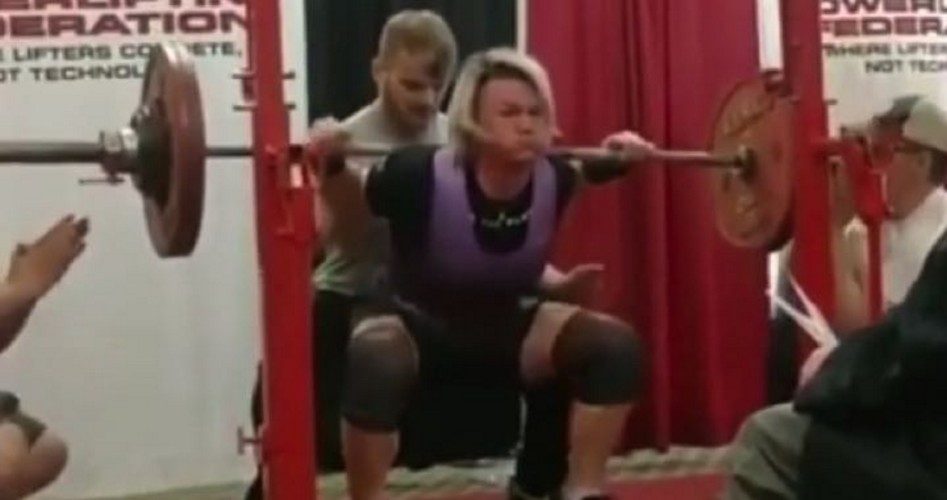
Transgender athlete Mary Gregory (shown) has reportedly “shattered” four women’s powerlifting world records on Sunday, but only Gregory seems to be celebrating.
A biological male who identifies as a female, Gregory set records in women’s squat, bench press, and deadlift, and scored a Masters world total record.
Gregory took to social media to celebrate his victory and remarked on how well he was treated by fans and officials. “What a day, 9 for 9! Masters world squat record, open world bench record, masters world dl record, and masters world total record!” Gregory posted to Instagram.
“A huge thank you to [RAW Powerlifting Federation], from the bottom of my heart! As a transgender lifter I was unsure what to expect going into this meet and everyone — all the spotters, loaders, referees, staff, meet director, all made me welcome and treated me as just another female lifter — thank you!” the athlete continued. “And thanks to all the fans in the audience who cheered me on and congratulated me!”
But despite Gregory’s contention that his participation in the event was well received, many female athletes have come forward to bemoan the unfairness of allowing males to compete in female sports. British Olympic medalist Sharron Davies and double Olympic champion Dame Kelly Holmes took to Twitter to share their concerns.
Davies tweeted, “This is a trans woman a male body with male physiology setting a world record & winning a woman’s event in America in powerlifting. A woman with female biology cannot compete… it’s a pointless unfair playing field.”
Holmes responded in support of Davies’ tweet: “It’s a bloody joke and all getting ready for biological women to boycott certain events. Have a trans category if need be but even better a trans games.”
Holmes added that allowing transgender athletes to participate in women’s events could provoke backlash against the transgender community. “Otherwise I’m starting to worry about the backlash and abuse that the trans community will get from spectators. It will happen!”
Davies elaborated on the unfairness of allowing males to compete in women’s athletics. “No surgery required today… no hormones… no medical diagnosis.. just self ID & reduced testosterone to a level x5 the highest average (98%) of XX females.. far worse than most realise. Madness & unfair,” she tweeted.
Beth Stelzer, founder of Save Women’s Sports, also criticized the event for allowing Gregory to compete against the natural-born women contestants. “Allowing men who identify as women (transgender women) to compete how they identify is demoralizing for women. It is not fair on a physical and emotional level. Allowing men to compete in women’s sports will be the end of women’s sports,” Stelzer said in an e-mail to Breitbart News.
This is not the first time we have seen a transgender athlete become a champion in a women’s event. Last year, transgender cyclist Rachel McKinnon won the women’s 2018 UCI Masters Track Cycling World Championship, provoking backlash from the public on social media.
TJDietz22 tweeted, “If you don’t think you have a scientifically unfair advantage then there’s literally no help for you. Period.”
Another remarked, “I’m sorry Dr. McKinnon, but you are not a woman, and never will be. Your male musculature, strength, stamina, etc. gives you a distinct & unfair advantage over the biological women competing in this race. That is not ‘transphobic,’ just factual.”
Of course, McKinnon relegated the criticisms to mere transphobia.
But debate over transgender individuals in sports has even split the LGBTQ community.
In fact, fears over allowing transgender women to participate in women’s athletics has dominated discussion over Congress’ “Equality Act” — legislation focused on prohibiting anti-LGBT discrimination in employment and housing.
During congressional testimony over the Equality Act, Duke Law School Professor Doriane Lambelet Coleman observed that biological males have an inherent athletic advantage over biological females because of the chemical makeup of their bodies, the Washington Blade reports. The intention of segregating sports based on sex was to allow individuals to compete against their own counterparts.
“Those of us who are athletes know that separation on the basis of sex is necessary to achieve equality in this space,” Coleman said. “With respect, it is accepted, beyond dispute, that males and females are materially different with respect to the main physical attributes that contribute to athletic performance.”
Even outspoken LGBT activists have raised concerns over transgender athletes. Julie Beck, a lesbian and former law and policy co-chair for Baltimore City’s LGBTQ Commission, asserts that the Equality Act would allow men to dominate women’s sports and could deny scholastic opportunities to girls who would have taken first place.
Image of Mary Gregory: Screenshot of YouTube video from AdamAndEveNotSteve




